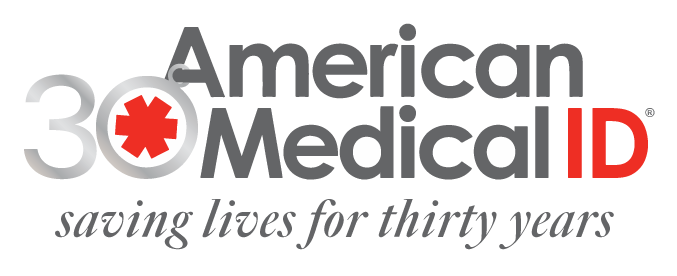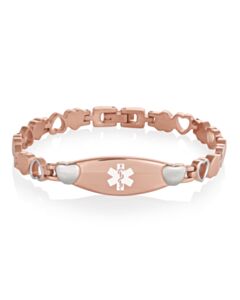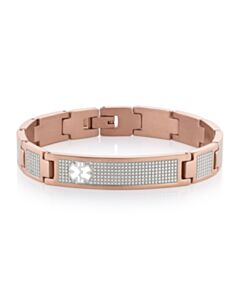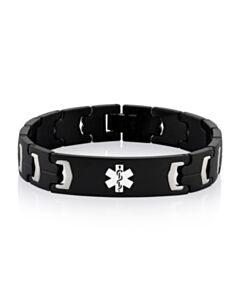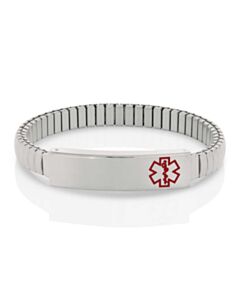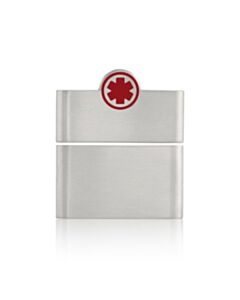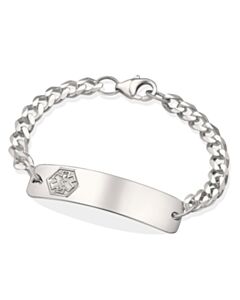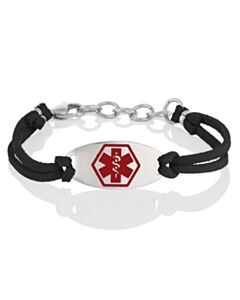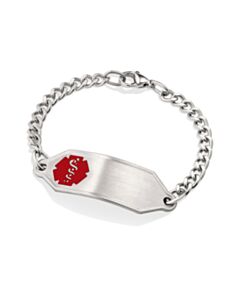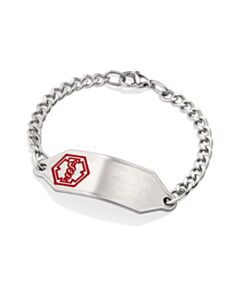

Medical IDs for Egg Allergy
A medical ID is recommended to anyone with egg allergy or immune hypersensitivity to proteins found in eggs. Eggs are one of the most common allergy-causing foods, especially in children. According to ACAAI, children who are allergic to eggs can have reactions ranging from a mild rash to anaphylaxis, a life-threatening condition that impairs breathing and can send the body into shock. An allergic reaction to eggs can happen unexpectedly and when it does, wearing a medical ID can help tell others what to do.
Egg allergies affect about one in 50 children and while 70% will outgrow the condition in adolescence, it's still important to wear a medical ID as long as the allergy persists.
"Wear an allergy bracelet or necklace. This can be especially important if you or your child has a severe reaction and can't tell caregivers or others what's going on." - Middlesex Health
Severe Symptoms of Egg Allergy
Symptoms of egg allergy in children and adults are caused by the body's immune system. As soon as it detects the offending food, it uses antibodies to fight it. Reactions can happen right away or after a few hours after exposure to eggs. Even if an allergic person tries to avoid eggs completely, some products may still contain some egg proteins or have been exposed to cross-contamination.
When allergic reactions are triggered, symptoms can make it difficult to communicate critical health information, most especially for young children. This is why a medical ID is important. Unless a child or adult with egg allergy wears some form of medical identification, the following symptoms can be misdiagnosed and delay emergency treatment such as an epinephrine injection or EpiPen shot.
- Skin reactions such as eczema, hives, or swelling
- Stomach pain, nausea, diarrhea, or vomiting
- Stuffy or runny nose
- Fast heartbeat
- Lip or eyelid swelling
- Itchy or watery eyes
- Itchy ears or throat
- Shortness of breath
- Wheezing or coughing
- Anaphylaxis or anaphylactic shock
Source: Healthline
Medical IDs and Egg Allergy in Emergencies
Every second counts in an allergic reaction. A study shows that emergency egg allergy reactions and food-induced anaphylaxis are increasing. Having an emergency plan and wearing a medical ID for egg allergy are more important than ever. Not only does it tell others what to do and who to call in an emergency, but also remind others of the presence of egg allergy. A medical ID can be an effective visual cue for an invisible but serious condition whether the allergic person is at school, work, or travel.
Many people with egg allergy also carry an injectable epinephrine or EpiPen. A medical ID can prompt first responders (including teachers or the nurse at school) to use this when allergic reactions turn into a real emergency. Certain medications and vaccines may also contain egg so it is important to communicate egg allergy before receiving any form of medical treatment. Wearing a medical ID can be a simple and effective way to let others know, even in the most difficult situations.
"Kids who have an egg allergy should have a plan in case they accidentally eat eggs. Work with your parents, doctor, and school nurse to have a plan in place. It may involve having medicine on hand, such as an antihistamine, or in severe cases, an epinephrine auto-injector. The doctor and your parents also might want you to wear a medical alert bracelet." - KidsHealth
What to put on an Egg Allergy Medical ID
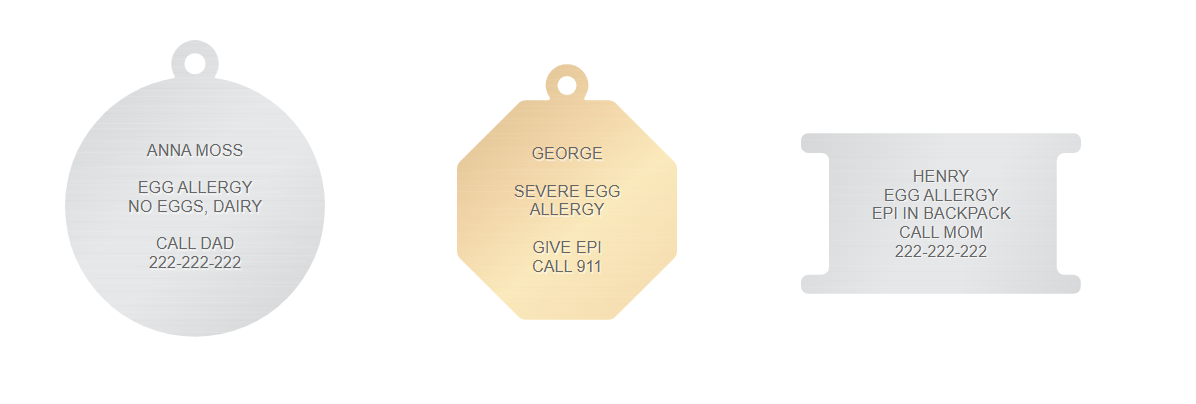

If you or your child has egg allergy, wearing a custom engraved medical alert ID is a must for safety and peace of mind. Information found on a medical ID can make the difference in avoiding accidental exposure to eggs and in receiving appropriate care in emergencies.
Here are some of the most important items to put on an egg allergy medical ID:
- Name
- Egg allergy – and if you have other food allergies or medical conditions
- Epi Pen information – alert others that epinephrine injection is needed in an emergency. Include location of the epi pen if they are inside a purse, pocket, or bag. This can be engraved as: give epipen, give epi, epi in bag or epi in purse for example.
- Emergency Contact – especially if a child is wearing the medical ID, list parent’s emergency numbers or a prompt to call 911 immediately.
Tip for parents: Kid friendly styles of medical IDs can help children enjoy wearing their allergy alert bracelet at all times and even encourage them to convey their egg allergy so others can watch out for them.
Our Adult Egg Allergy Bracelet & Wristband Options
When selecting an egg allergy bracelet, you have many different options in styles, metal types, and more. Here are some of our more popular options.
Featured/Best-Selling Egg Allergy Jewelry
Shop our top selling egg allergy bracelet and necklace options.
Egg Allergy Bracelets for Kids
Our kids egg allergy bracelets are available in sizes from toddler up to teenager and also in different metal types and styles to select from.
Frequently Asked Questions
Should I wear a medical alert bracelet for egg allergy?
Yes: If your egg allergy could cause a medical emergency, or possibly alter how medical treatment is provided to you in an emergency, you should wear a medical alert bracelet or necklace. A medical professional can help you determine if you meet this criteria if you are unsure.
What is the medical alert symbol for egg allergy?
There is no icon for an egg allergy so it is best to engrave “Egg Allergy” or “EGG ALGY” on your medical ID to ensure it is understood by emergency medical personnel.
Should I still carry an egg allergy card if I wear an egg allergy alert bracelet?
We always recommend an expandable wallet card since you can store important medical information, such as additional allergies, medications, and emergency contacts in that wallet card. However, a wallet card is not a substitute for an accurate medical ID bracelet or necklace, so it is best to have both in every situation.
"If your child has an egg allergy, always keep two epinephrine auto-injectors available in case of a severe reaction... Also consider having your child wear a medical alert bracelet." - The Barbara Bush Children's Hospital



 - UK
- UK  - Canada
- Canada  - Australia
- Australia 